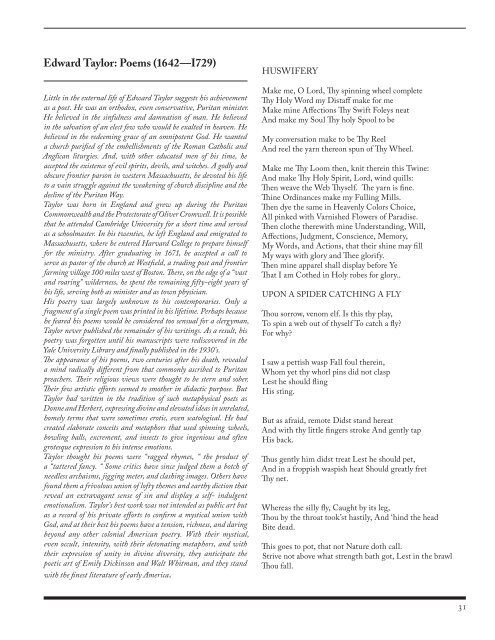fieldston american reader volume i â fall 2007 - Ethical Culture ...
fieldston american reader volume i â fall 2007 - Ethical Culture ...
fieldston american reader volume i â fall 2007 - Ethical Culture ...
- No tags were found...
You also want an ePaper? Increase the reach of your titles
YUMPU automatically turns print PDFs into web optimized ePapers that Google loves.
Edward Taylor: Poems (1642—I729)Little in the external life of Edward Taylor suggests his achievementas a poet. He was an orthodox, even conservative, Puritan minister.He believed in the sinfulness and damnation of man. He believedin the salvation of an elect few who would be exalted in heaven. Hebelieved in the redeeming grace of an omnipotent God. He wanteda church purified of the embellishments of the Roman Catholic andAnglican liturgies. And, with other educated men of his time, heaccepted the existence of evil spirits, devils, and witches. A godly andobscure frontier parson in western Massachusetts, he devoted his lifeto a vain struggle against the weakening of church discipline and thedecline of the Puritan Way.Taylor was born in England and grew up during the PuritanCommonwealth and the Protectorate of Oliver Cromwell. It is possiblethat he attended Cambridge University for a short time and servedas a schoolmaster. In his twenties, he left England and emigrated toMassachusetts, where he entered Harvard College to prepare himselffor the ministry. After graduating in 1671, he accepted a call toserve as pastor of the church at Westfield, a trading post and frontierfarming village 100 miles west of Boston. There, on the edge of a “vastand roaring” wilderness, he spent the remaining fifty-eight years ofhis life, serving both as minister and as town physician.His poetry was largely unknown to his contemporaries. Only afragment of a single poem was printed in his lifetime. Perhaps becausehe feared his poems would be considered too sensual for a clergyman,Taylor never published the remainder of his writings. As a result, hispoetry was forgotten until his manuscripts were rediscovered in theYale University Library and finally published in the 1930’s.The appearance of his poems, two centuries after his death, revealeda mind radically different from that commonly ascribed to Puritanpreachers. Their religious views were thought to be stern and sober.Their few artistic efforts seemed to smother in didactic purpose. ButTaylor had written in the tradition of such metaphysical poets asDonne and Herbert, expressing divine and elevated ideas in unrelated,homely terms that were sometimes erotic, even scatological. He hadcreated elaborate conceits and metaphors that used spinning wheels,bowling balls, excrement, and insects to give ingenious and oftengrotesque expression to his intense emotions.Taylor thought his poems were “ragged rhymes, “ the product ofa “tattered fancy. “ Some critics have since judged them a botch ofneedless archaisms, jigging meter, and clashing images. Others havefound them a frivolous union of lofty themes and earthy diction thatreveal an extravagant sense of sin and display a self- indulgentemotionalism. Taylor’s best work was not intended as public art butas a record of his private efforts to confirm a mystical union withGod, and at their best his poems have a tension, richness, and daringbeyond any other colonial American poetry. With their mystical,even occult, intensity, with their detonating metaphors, and withtheir expression of unity in divine diversity, they anticipate thepoetic art of Emily Dickinson and Walt Whitman, and they standwith the finest literature of early America.HUSWIFERYMake me, O Lord, Thy spinning wheel completeThy Holy Word my Distaff make for meMake mine Affections Thy Swift Foleys neatAnd make my Soul Thy holy Spool to beMy conversation make to be Thy ReelAnd reel the yarn thereon spun of Thy Wheel.Make me Thy Loom then, knit therein this Twine:And make Thy Holy Spirit, Lord, wind quills:Then weave the Web Thyself. The yarn is fine.Thine Ordinances make my Fulling Mills.Then dye the same in Heavenly Colors Choice,All pinked with Varnished Flowers of Paradise.Then clothe therewith mine Understanding, Will,Affections, Judgment, Conscience, Memory,My Words, and Actions, that their shine may fillMy ways with glory and Thee glorify.Then mine apparel shall display before YeThat I am Cothed in Holy robes for glory..UPON A SPIDER CATCHING A FLYThou sorrow, venom elf. Is this thy play,To spin a web out of thyself To catch a fly?For why?I saw a pettish wasp Fall foul therein,Whom yet thy whorl pins did not claspLest he should flingHis sting.But as afraid, remote Didst stand hereatAnd with thy little fingers stroke And gently tapHis back.Thus gently him didst treat Lest he should pet,And in a froppish waspish heat Should greatly fretThy net.Whereas the silly fly, Caught by its leg,Thou by the throat took’st hastily, And ‘hind the headBite dead.This goes to pot, that not Nature doth call.Strive not above what strength bath got, Lest in the brawlThou <strong>fall</strong>.31
















